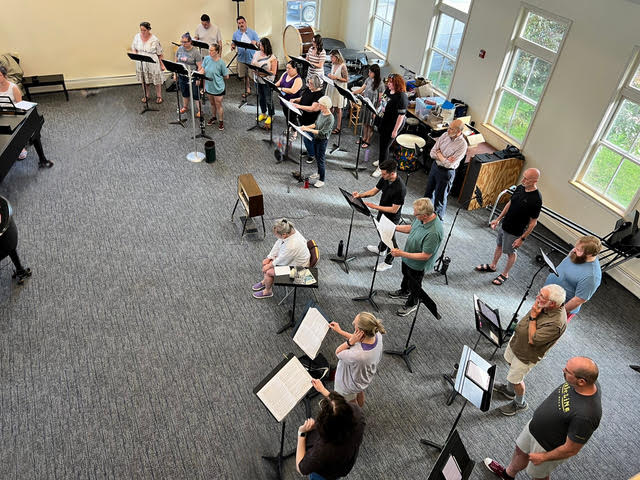By RICHARD KNOX
The centerpiece of New Hampshire Chorale’s two concerts on Father’s Day weekend is “The Radio Hour,” an innovative one-act “choral opera” about a woman who’s given a new lease on life by a trip through Radioland.
The concerts’ second half will transport audiences to the studio of a 1940’s radio variety show, featuring swing-band arrangements of golden oldies such as “Our Love Is Here to Stay” and “Blues in the Night.”
The concerts will take place on Friday, June 15, at the South Church on Pleasant Street in Concord, and Saturday, June 16 at the Plymouth Congregational Church. Tickets, available at the door or through nhmasterchorale.org, are $30 for adults, $25 for seniors or military members, free for K-through-undergraduate students and “pay what you’re able” for others.
Dan Perkins, the Master Chorale’s founder and music director, says these concerts’ homage to radio stems from his adolescent fascination with the medium. “I love the power of radio and how, like a book, it forces us to imagine images, places and faces that are clearly spelled out – or perhaps spoon-fed to us – in film and on the stage,” Perkins says.
He programmed “The Radio Hour” because “it’s unlike anything we’ve done.” The Master Chorale is known for its diverse mix of musical repertoire, from classical masters such as Bach, Mozart and Haydn to contemporary works, including nearly 30 works the group has commissioned.
It’s a good bet that Master Chorale audiences won’t have heard anything like “The Radio Hour” either. Conventional opera features principal soloists singing arias and recitatives, with occasional choruses. In this “choral opera,” the narrative is entirely sung by the chorus while the principal character – a hard-working, lonely, depressed, middle-aged woman named Nora – is played entirely in pantomime by the well-known New Hampshire actor Lisa Lovett.
At the outset Nora is having a very bad day. She seeks solace by locking herself in her apartment and turning on the radio. The choir is initially split in two – one half representing Nora’s inner voice and those of nagging inanimate objects. The other semi-chorus sings voices that emanate from her radio.
The radio voices lure Nora into Radioland – a mystical journey reminiscent of “Alice in Wonderland,” “The Wizard of Oz” or the fantasy world of Harry Potter. They guide her to make the choice to reconnect and, in Heggie’s words, “become joyful, youthful and energized again.”
The music, which will involve a chamber orchestra, explores a variety of textures, colors and sounds – traffic noise, big-band swing tunes, radio ads, a quasi-rap song, a touch of esoteric 12-tone music and finally, a flowering of grand choral singing.
The piece involves movement and acting by choristers. It’s staged by Michael Stoddard, an actor/director well-known to area audiences. Stoddard finds Nora highly relatable: “We’ve all experienced moments when we feel stuck, alone and lost, when our long paths lead to dead ends.”
Jake Heggie, who composed “The Radio Hour” with a libretto by Gene Scheer, recalls that composing the 40-minute opera was “a terrifying challenge.” The piece was commissioned a decade ago by John Alexander, artistic director of the Pacific Master Chorale in Los Angeles.
“Truthfully, when John…asked us to create a choral opera, our first response was: A what?” Heggie says. “Operas require action, characters, conflicts, journeys, transformation, movement. Choirs stand still and make beautiful sound. Right?”
Heggie is at the forefront of modern-day opera innovators. According to the Metropolitan Opera, his thought-provoking first opera, “Dead Man Walking,” is the most-performed contemporary work in that medium of the past 20 years. It’s an adaptation of a popular memoir by Sister Prejean about her effort to save the soul of a convicted murderer.
The second half of the upcoming concerts is an adaptation of “The 1940s Radio Hour,” a full-fledged musical that played on Broadway in 1979-80.
Perkins says the Master Chorale’s version “is really just an excuse to revisit some of the music from the 1940s which will be so familiar to our audiences.” In swing-style, close-harmony arrangements typical of the time, concert-goers will hear “Our Love Is Here to Stay,” “Ain’t She Sweet,” “Blue Moon,” “I’ll Never Smile Again,” “Blues in the Night,” “Strike Up the Band,” and “I’ll Be Seeing You.” And even a Pepsi commercial.





